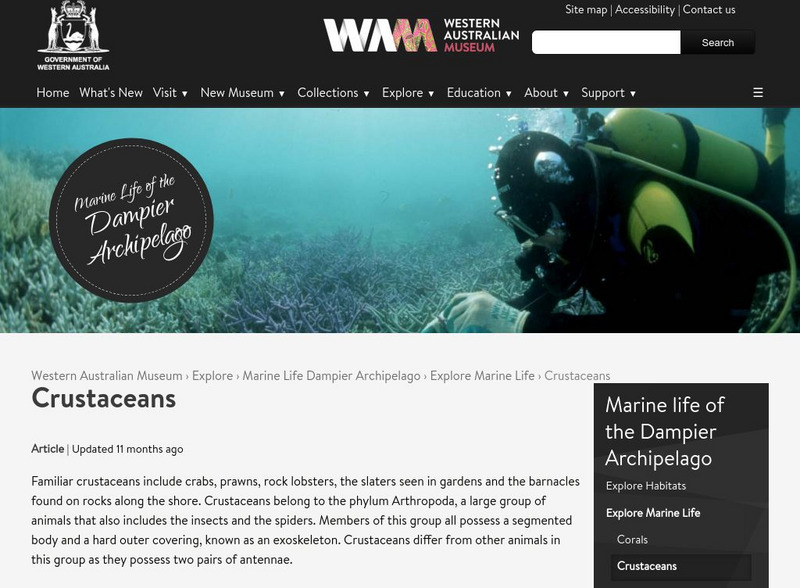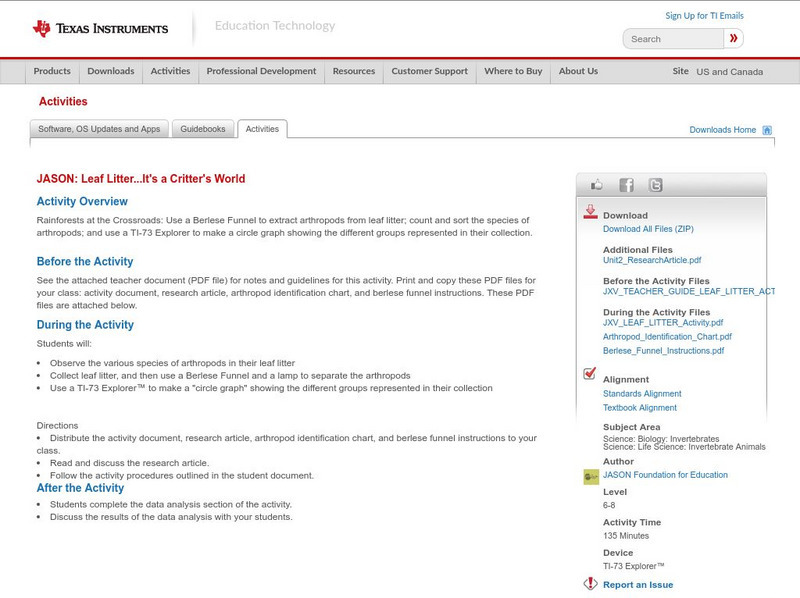National Wildlife Federation
Spider Sensations
Know that feeling when walking into a spider's web? Feel it from the other end! Scholars learn about the body parts of a spider and the specific spiders known as orb-weavers. Groups play a game to figure out how a spider finds its food...
Biology Junction
Invertebrates
How many different invertebrates can you name? A thorough presentation describes the eight different Phyla of invertebrates. Each slide gives a quick overview of the important physical characteristics of each of the Phyla.
Biology Junction
Arthropods
Even the creepy crawlers have pretty amazing anatomy! A thorough lesson describes characteristics of arthropods with an emphasis on their structures. Beginning with a review of the taxonomy hierarchy, the lesson explains the different...
McGraw Hill
Arthropods
Are spiders related to crabs? Study the order of arthropods with a reading selection about animal diversity. It provides details about each class within the order, as well as vivid pictures and explanatory charts.
Curated OER
Creating a Family
Fifth graders make a model and write an essay of a new arthropod family using known data.
Curated OER
Arthropods at Home: Spider, Isopod, or any Arthropod
Second graders observe, discuss, and record the requirements of a healthy environment for both arthropods and people by designing and maintaining an artificial habitat for an arthropod, and considering the requirements for a healthy body...
Curated OER
Phylum Arthropoda Concept Map
In this biology activity, students complete a concept map of the Phylum Arthropoda using the word list given. They fill in the 10 blanks with correct answers.
Curated OER
Arthropod Worksheet
In this arthropod worksheet, students answer 4 questions about arthropod. For example, "Match the name of each class with the correct drawing" and "Draw a circle around any insects."
Curated OER
Arthropod Mouth Parts and Food
Learners identify the different types of mouths arthropods have for eating various types of food. Given photographs of the different types of arthropods, students identify which mouth they have and what type of food they can eat with...
Curated OER
Arthropod Data Collection
Students describe the life cycle of various bugs as well as their predators and feeding habits. The class participates in a discussion of the various methods scientists use to gather data including research and experiment. After...
Curated OER
Centipede or Millipede?
Learners discuss millipedes and centipedes in terms of their classification as arthropod. Using a diagram, students categorize and compare and contrast the characteristics of millipedes and centipedes based on their discussion of...
Curated OER
Insect or Spider?
Students compare and contrast the difference between insects and spiders. After a brief class discussion, students complete an activity matching the body parts of an insect and the body parts of a spider. Worksheet with answer key is...
Curated OER
Jewel of the Earth
Students investigate several organisms, set sticky traps to collect them, and attempt to identify and classify them using a variety of sources. The origins of the organisms are traced and their adaptive features examined.
Curated OER
Arthropod Key
Students identify the types of pests and categorize them. They identify their food chain and create a poster showing the food chain for the pests.
Curated OER
Classification of Living Things
In this biology worksheet, students identify and locate various vocabulary terms relating to the classification of living things. There are 28 biology terms located in the word search.
Curated OER
Types of Legs
Students identify the characteristics of the legs of arthropods as well as how they are used. They compare and contrast the legs of various types of bugs in the arthropod family. A comparison worksheet is included in with this lesson.
Other
Western Australian Museum: Crustaceans: Marine Life of the Dampier Archipelago
Do you know how Crustaceans differ from other animals that belong to the Arthropod family? Find the answer to this question along with other interesting facts about this marine animal.
Texas Instruments
Texas Instruments: Jason: Leaf Litter, It's a Critter's World
Rainforests at the Crossroads: Use a Berlese Funnel to extract arthropods from leaf litter; count and sort the species of arthropods; and use a TI-73 Explorer to make a circle graph showing the different groups represented in their...
Other
Walking Well: Arthropod Stings
This site has interesting information about stings from different arthropods like bees, wasps, hornets, yellow jackets, ants, caterpillars, spiders, ticks, centipedes, millipedes, and scorpions.




















